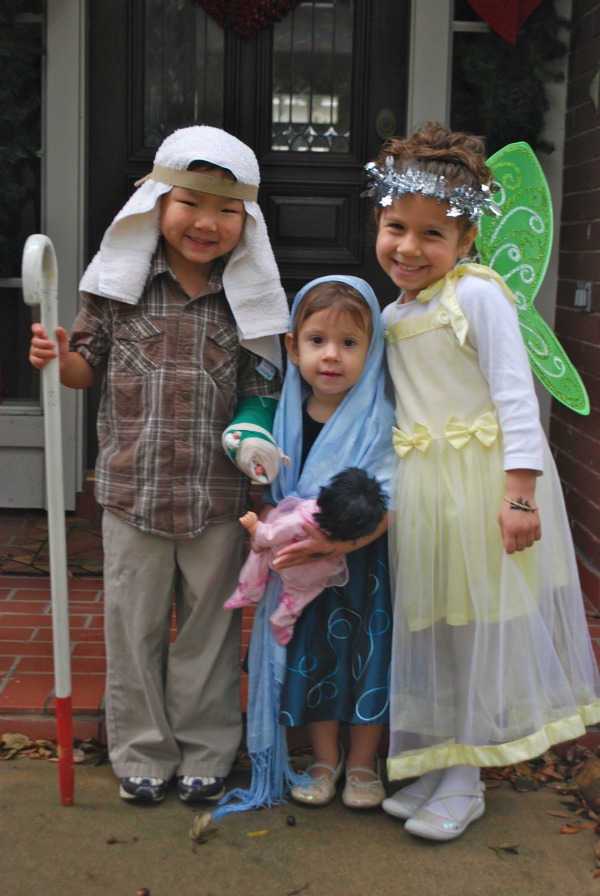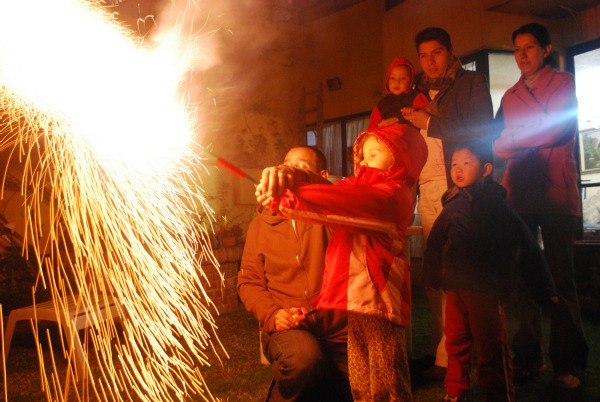Passing on cultural traditions (both Mexican and US) to our children is extremely important to my husband and I: language, food, celebrations and religion are four significant areas that we try to integrate into our lives. Not only does it help them identify with both the English and Spanish communities, but these daily and special occasions strengthen the bond we have within our family, instill pride in their heritage and increase their language competence.
When my husband was growing up in Mexico City, his family and friends would celebrate Las Posadas every December. “Las Posadas” (which means “lodging”) is a lovely tradition celebrated the 9 days preceding Christmas (the number representing the nine months of pregnancy that Mary carried Jesus). Though before getting married I had never been invited to a posadas party, once we had children we began to incorporate this custom into our family, with some adaptations (usually only having one posada instead of the traditional 9!). We celebrate this with friends and family to teach our children about the birth of Jesus and to incorporate an important Mexican cultural tradition into our Christmas.
Las Posadas try to represent or relive the pilgrimage of Mary and Joseph to Bethlehem (Belén) while they’re trying to find a place to stay — with a celebration at the end when they finally find their lodging and Jesus is born.
In Mexico, it starts with a song, as a statue of Mary and Joseph parade through the neighborhood. In some cases, the procession is very elaborate with musicians, instruments or even live animals. We went to a huge posada in Chicago one year with a donkey, cows, sheep, and goats — the kids were so interested in the animals they didn’t want the procession to end! The children carrying the statues knock on (predetermined) doors, asking if they have any room in the inn in a simple, but eloquent song called “Pidiendo Posadas.” My kids love when I break down the Spanish lyrics and explain each line:
|
En el nombre del cielo
os pido posada pues no puede andar mi esposa amada. |
In the name of Heaven
I beg you for lodging, for my beloved wife who cannot walk. |
People (“innkeepers”) keep denying them a place to stay until finally the family who is hosting the posada allow the Holy Family to stay at with them. They open their house and offer food (tamales, mole, tacos) to all of the procession. The hosts also always serve the typical warm drink of ponche: a homemade punch of cinnamon, piloncillo (raw sugar), boiled with lots of fruit: tejocotes, guayabas, ciruela pasas (prunes), pasas (raisins), and tamarindo, using caña (sugar cane) to stir it. Sometimes adults add rum or brandy!
The mood of the party is vibrant and exciting, and guests’ senses are stimulated by the smells of the delicious feast, the sounds of music, and all of the lights. While parents socialize, the children play with luces de bengala (sparklers) and other types of fireworks and then get to break the piñata that is filled with fruit like mandarinas, mini-jicamas, tejocotes, peanuts, and more sugar cane. Finally, the kids get a little basket with confitones (candied almonds), chocolate and other candy.
The kids LOVE it!!! Everyone is speaking Spanish, playing with each other, marveling at the rarity of the sparklers. Something we love about parties in Mexico is that families celebrate together: it’s not an adult party nor is it a kids party, it’s a family party. Las posadas begin with a religious reenactment of Mary and Joseph’s journey, and end in a fiesta with great food, lots of joking and talking, and families having fun together. This is what we hope to replicate when we make our own posada here in the US: learning about the story of Christmas, modeling warm hospitality, and spending time as a family while celebrating with our dearest friends.






Love the picture of your children dressed up! What a beautiful tradition to continue passing on to them! Loved the post!
Thank you Frances! That means so much to me:). It is a beautiful tradition that combines culture, religion, and language. We were just talking about it with the kids because we are having our big posada this Sunday, and my little one asked “Is that the party with the baby Jesus in the bread (rosca de reyes) or is that the party where we play with the fireworks?” At least she is starting to remember some of the traditions:).
At least she is starting to remember some of the traditions:).
Beautiful article that evokes some nice memories and ganas to also do posadas when my little girl gets older. By the way, I loved your website http://kidworldcitizen.org/ and told some friends about it!
Thank you so much Diane! You should have a posada for your little girl one time! Although I never did as a child, my husband has wonderful memories, and he loves passing on the tradition to our kids. I think family traditions are so important to help create an identity for kids, to strengthen family bonds, and to pass on values, etc, etc- and it’s neat that parents can choose and create their own traditions that we want our family to have…
Although I never did as a child, my husband has wonderful memories, and he loves passing on the tradition to our kids. I think family traditions are so important to help create an identity for kids, to strengthen family bonds, and to pass on values, etc, etc- and it’s neat that parents can choose and create their own traditions that we want our family to have…
Thanks for the shout-out of my website:)- it’s a labor of love!
Thanks for this post Becky! I grew up celebrating Posadas as well, I love everything about them
Thanks Xochitl!:) Our big posada is this Sunday and I am already preparando todo!!!!
Becky-
Thanks so much for the post. I love the photos.
Your story inspired me to investigate and find a Posada near us. I had no clue there were any in the U.S. let alone in Denver. As luck would have it, a church not too far has one for the 9 days leading to Noche Buena. I can’t wait to take the ninas to see this and let them experience their culture first hand.
That is so neat Beth!! I hope you get to go with your daughters- we have seen some churches around here have them as well:). What a great way to experience culture, locally!
What’s up, its fastidious post on the topic
of media print, we all be aware of media is a fantastic source of information.
What i do not realize is actually how you’re no longer actually a lot more smartly-favored than you might be now.
You’re very intelligent. You recognize thus considerably in relation to this topic, produced me individually consider it from numerous numerous angles.
Its like women and men are not fascinated except it’s one thing to do with Lady gaga!
Your own stuffs nice. At all times deal with it up!
Right here is the perfect site for anybody who hopes to find out about this topic.
You know so much its almost tough to argue with you (not that I really would want to…HaHa).
You certainly put a fresh spin on a subject that’s been written about for a long time.
Great stuff, just wonderful!
Good information. Lucky me I came across your blog by accident (stumbleupon).
I have bookmarked it for later!
This is very interesting, You’re an excessively
skilled blogger. I’ve joined your feed and look ahead to searching for more of your fantastic post.
Additionally, I have shared your site in my social networks
you are in point of fact a good webmaster. The site loading
speed is incredible. It seems that you’re doing any unique trick.
Furthermore, The contents are masterpiece. you’ve performed a excellent job in this
matter!
It’s an remarkable article for all the web visitors;
they will obtain advantage from it I am sure.
What’s up mates, nice post and nice urging commented at this place, I
am genuinely enjoying by these.
For most recent news you have to pay a visit world wide web
and on world-wide-web I found this web page as a most excellent website for most recent updates.